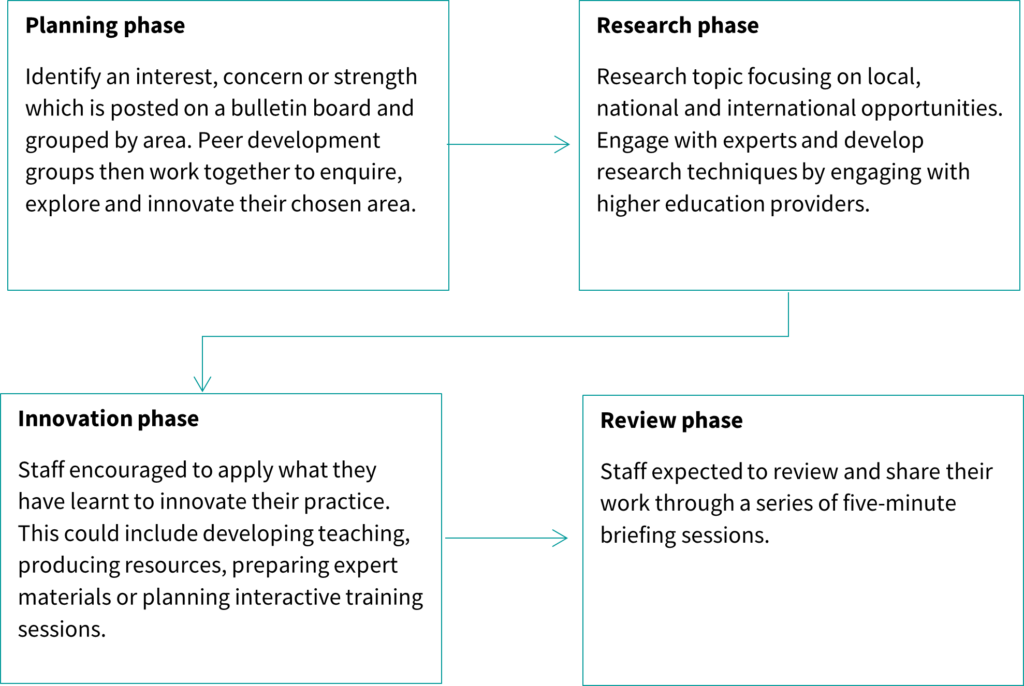 Ysgol Aberconwy
Ysgol Aberconwy
Focussed on the application of professional learning
Information about the school
Ysgol Aberconwy is an English-medium 11-18 mixed comprehensive school situated in Conwy. The school has around 910 pupils on roll, including around 150 in the sixth form.
Approach taken
The Professional Standards highlight the importance of wider reading, engagement in action research, experimentation and reflection in the development of teachers’ knowledge, skills and professional practice. Historically, however, such approaches were not a prominent feature of professional learning strategies at Ysgol Aberconwy and it was acknowledged that the idea of getting involved in anything labelled ‘research’ would be a ‘turn-off’ for some (though by no means all) practitioners.
Leaders at the school recognised the need to take an incremental, iterative approach to engaging staff with research, with ‘experimenting’ and with reflecting upon the efficacy of new approaches. Leaders came up with a four stage ‘innovation cycle’ designed to steer staff through an action research process in an accessible way, as illustrated in Figure 3 below.

Figure 3: Ysgol Aberconwy Innovation Cycle
The innovation cycle is expected to be completed over the course of the academic year, with the planning phase starting in October and the review phase concluding at the end of the summer term. Four ‘check points’ have been built into the cycle, essentially replacing Professional Learning Community (PLC) meetings previously scheduled into the school’s calendar. Staff at the school had identified that professional learning in PLC meetings had become passive, and leaders responded with the introduction of this new cycle. Aligning PLC meetings with the innovation cycle was an attempt to make those sessions ‘more engaging … more staff led and more empowering’. The first innovation cycle was launched at Ysgol Aberconwy in October 2019.
In introducing the innovation cycle, leaders were careful to ‘downplay the formality of research’ within the activities to be undertaken: the intention was simply ‘to enthuse people to develop their own project’ and to ‘encourage people to have a go at finding something out’. It was recognised that educational leaders had been ‘banging on about research’ for some time, but that little tangible activity took place at the chalk face in Ysgol Aberconwy. The innovation cycle was seen as a means of ‘engaging staff in that area of professional learning’ by providing them with the wherewithal to get ‘stuck in… try something new, based on what they found out… experiment in the classroom and see how things work in practice’, with the ultimate goal of ‘improving things for children’.
Staff were organised into ‘peer development groups’ to explore themes of common interest. These themes were identified through a whole school ‘post-it’ note exercise during which staff were asked to record ‘things that bug them’, ‘things that get under their skin’. Senior leaders were careful not to steer the themes selected, leaving it to practitioners to come up with issues that genuinely interested them or sparked their curiosity. Practitioners found this freedom to choose one’s own theme ‘interesting and empowering’.
The establishment of peer development groups (triads) on the basis of shared interests meant that practitioners worked with colleagues who were curious about similar things. Leaders were careful to place practitioners in groups comprising people with whom they did not normally engage in professional dialogue e.g. practitioners from different departments or highly experienced practitioners with newly qualified teachers. Each peer development group was required to appoint a group leader to be responsible for monitoring and reporting upon the group’s progress. School leaders encouraged the use of the Blue Sky Education[1] performance management system to capture notes of groups’ discussions and the findings of enquiries.
Leaders allow practitioners time to plan to incorporate new approaches into daily routines
The innovation cycle allows almost four months for practitioners to explore an area of interest. During this time, staff are encouraged to review literature, to search for resources and to engage with experts both within and outside the school. At the conclusion of this period, staff are expected to have identified innovations or new approaches that they would like to build into their classroom practice.
Two senior leaders kick-started this process by giving peer development groups a short presentation on approaches that might be taken to researching particular themes. They were careful, however, to avoid being too prescriptive and to allow some room for groups to decide upon their own approach. It was recognised, however, that ‘the average teacher isn’t sure of where to go’ in search of relevant material and the school’s professional learning lead provided guidance, as required.
Peer development groups were issued with a short ‘pro-forma’ designed to help them structure their thinking and keep track of progress at each of the four phases of the innovation cycle. The pro-forma invites groups to set out how they intend to go about researching their theme, to record details of research carried out and to note ‘key learning points’ to emerge. The innovation phase section of the pro-forma invites groups to set out their ‘innovation plan’ and to record the ‘outcomes’ of innovations made.
School leaders seek to ‘make the time’ to allow practitioners to undertake research and to meet with their peer development groups. This includes four annual ‘check-point’ events planned into the innovation cycle and time set aside, as needed, during scheduled staff meetings. School leaders also look to provide cover to enable individual practitioners to observe and talk to colleagues (recognising that there is a great deal of expertise within Ysgol Aberconwy), to attend particular events or to visit other schools.
There is also an expectation that practitioners will find the time to conduct their enquiries and to engage with their peer development groups. In this context, it was noted that there has been a growth in the incidence of staff at Ysgol Aberconwy discussing pedagogical approaches with colleagues, both formally (within peer development groups) and informally (in the staff room).
Leaders ensure that time for practitioners to build upon what has been learned by testing out new understanding, skills, techniques and strategies
The innovation cycle timeline allows two months for practitioners to apply what they have learnt during the research phase and to test out any new approaches. The innovation phase of the first cycle was expected to start in mid-March 2020 but was essentially overtaken by the effects of the COVID-19 outbreak upon schools. The intention had been that groups would plan programmes of activities such as lesson observations and feedback.
Leaders ensure that practitioners are given the time to reflect on the effects of changes made
The innovation cycle timeline allows a two-month period for the review phase (between May and the end of the summer term) and the pro-forma includes a review section where peer development groups are required to record the effects and effectiveness of innovations introduced and to consider what future developments might be appropriate.
This process of reflection feeds into individual practitioners’ performance management/professional development reviews. Each member of staff is set three objectives at the start of the year and since 2019, one of these relates to the innovation cycle theme with which individuals are involved.
School leaders encourage staff to record the deliberations and findings of their peer development groups on the Blue Sky performance management system, thus potentially allowing their experiences to be shared across the school. Leaders also regard the system as a means of capturing material to inform performance management discussions between practitioners and their coaches/line managers.
Given the impact of COVID-19, the first full innovation cycle was concluded in summer 2021. An overarching evaluation of the innovation cycle programme was completed by the senior leadership team with consideration being given to:
- activities that have been planned being completed
- performance management/professional development objectives being met
- classroom practice moving on
- staff developing a better understanding of the way in which research can contribute to professional development
- staff engaging in a more formal, ‘in-depth’ research/innovation process in the next round
- staff being willing to engage with a university to strengthen the research being undertaken during the next innovation cycle
- the innovation cycle being judged a success.

